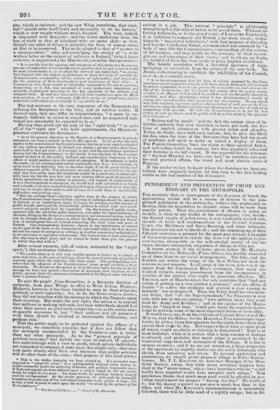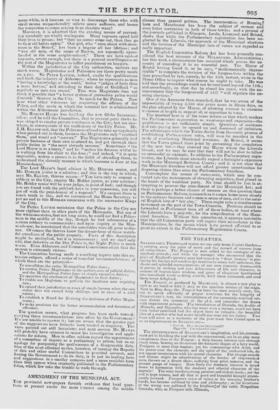PUNISHMENT AND PREVENTION OF CRIME AND BEGGARY IN THE METROPOLIS.
THE certainty that, in consequence of the dearness of bread, the approaching winter will be a season of distress to the pau- perized population of the metropolis, induces the unpleasant re- flection, that the temptation to commit crime will be more than usually potent. That the punishment of offences is going on briskly, is clear to any reader of the newspapers; who, besides the diurnal supply of police cases, is new constantly treated wits records of trials and condemnations at the Central Criminai Court, the Middlesex and Surry Sessions, and other tribunals. The prisoners amount to hundreds; and the summing-up of their (lament sentences is perused for the most part without a thought of the encouragement to violate the laws—of the neglect to pre- vent crimes, chargeable on the self-satisfied society of the vir- tuous, because untempted, supporters of things as they are.
A recent perusal of the evidence given before Mr. Hswes's Committee on the Metropolis Police Offices, has forcibly reminded us of these blots in our social arrangements. The City, and the districts not within the range of the New Police, are most ob- nuxious to just censure. In all parts of the town, however, it ap- apears from Sir FREDERICK Roe's statement, that many uu- deubted culprits escape punishment from the incompetency or venality of the parties who ought to prosecute offenders. Mr. THOMAS. now of Manchester, is the only constable that "hail any notion of getting up a case against a peisoner;" and tile efforts of friends " to soften the evidence and prevent a case coming to maturity" are undisguised. Then the Police itself has this mate- rial defect, that "all the Superintendents" Sir FREDERICK ever saw, with one or two exceptions, " were military men ; they came from the Army and Artillery ;" and in the opinion of the Magis- trate, no "length of time " would give them the requisite know- ledge to perform some of the more important duties of their office.
It would seem, too, from the evidence of Colonel ROWAN aud Mr. Mitves, that the Refuge for the Houseless Poor encourages vaga- bonds, by giving them free quarters for the night, from which they pursue their trasle by day. But suppose there were no such place of resort, would mendicity or thieving be diminished? Teat is at least doubtful; while it is certain that a large amount of distress is relieved, and probable that much crime is prevented by the benevolent supp.irters and managers of the Refuge. It is fair to assume so much; and if we are not mistaken, a large proportion of the applicants for nightly shelter are the really distressed, who shrink from meudicity amid crime. To prevent purloining and prostitution, we should prefer places oh' refuge to Police Station- houses, Mr. T. L. Keevirr, an Assistant Manager of the Men- dicity Society, states, that while many notorious beggars have slept at the " straw-house," others have been there who he "could hardly have expected would have accepted such refuge." This gentleman thinks that much more good would be effected by pro- viding employment for paupers " during the day." No doubt of it ; but the money required in one case is much less than in the other, and when Mr. 1C:smarm's recommendation is extensively followed, there will be little need of a nightly refuge; but in the
mean while, is it humane or wise to discourage those who with small means unquestionably relieve many sufferers, and lessen the temptation to crime arising trent absolute want?
Moreover, it is admitted that the existing means of prevent- ing mendicitv are wholly inadequate. Many vagrants spend half their lives in prison ; but " they no sooner come out, than they go to thtir old habits again." One girl, who " runs about with moss- roses hi the Strand," has been a beggar all her lifetime; and " two old men, of the name of Burton, are repeatedly appre- hended in the same neighbourhood." There are laws against vaorants, severe enough, but there is a general unwillingness on the part of the Magistrates to inflict punishment on beggars. Within the jurisdiction of the City authorities, matters are much worse. Magistrates and Policemen are there pretty much on a par. Sir PETER LAURIE, indeed, exalts the qualifications and lauds the industry of Aldermen ; whom he represents as men " having a knowledge of the world," better "judges of facts than a mere lawyer," and attending to their duty at Guildhall " as regularly as men can attend." This wise Magistrate does not think it possible that "a better system of preventive police would diminish " thievery in the City. So much for Sir PETER. Now hear what other witnesses say respecting the efficacy of the Police, and the mode in which the criminal law is administered within the Aldermanic jurisdiction. Mr. ROBERT HICKS was building, the new Globe Insurance- offiee : and he told the Committee, that to prevent petty thefts he Was obliged to employ private watchmen in the City, but not else- where, in consequence of the inefficiency of the City Police. Mr. J. H. ELLIOT said, that the Policemen refused to take up vagabonds when pointed out to them, because the Magistrates only "snubbed them," and would not "convict." The Magistrates generally had private business of their own to attend to, and got through their public duties in " the most slovenly manner." Sometimes 0 the Lord Mayor is in a hurry," and he " makes his decision whilst he is walking from his chair to the door ;" and indeed, " it is quite impossible, unless a person is in the habit of attending there, to understand the slovenly manner in which business is done at the Mansionhouse."
The Lord Mayor's legal adviser is Mr. HOFILER senior, and Mr. Hoemin junior is a solicitor ; and this is the way in which, says Mr. ELLIOT, thieves reason—" You have only to commit a robbery in the City, employ Mr. Nobler junior, as your solicitor ; Mr. Hobler senior will be your judge, in point of fact ; and though you are found with the picklock-keys in your possession, you will get off with the punishment of a vagrant." We suspect there is much truth in this, and we recommend the Home Secretary to put an end to this HOBLER connexion with the successive Kings of the City. Sir PETER LAURIE maintains that the Police in the City are more vigilant than in other parts of the Metropolis. But one of the witnesses states, that not long since, he could not find a Police- man in the middle of the day, though he had information of a serious robbery to communicate ; and upon inquiry at the Man- sionhouse, he ascertained that the constables were all gone to din- ner. Of course the thieves know the dinner-hour of these watch- ful guardians of the public property. Facts of this description might he multiplied, but it is unnecessary ; and we shall only add, that defective as the Day Police is, the Night Police is much worse. Even Aldermen and Common Councilmen admit that the system is extremely vicious. The Committee having made a searching inquiry into this ex- tensive subject, offered a series of remedial recommendations ; of which these are the principal—
To consolidate the entire Metropolitan Police force ; To confine Police Magistrates to the performance of judicial duties,
and the Metropolitan Police force to simply executive duties ; To apportion the emolument of Magistrates to their duties ;
To enable one Magistrate to perform the functions now requiring two ; To extend their jurisdiction to cases of simple larceny when the sum stolen does not exceed forty shillings, and to eases of a civil nature;
To establish a Board for Revising the decisions of Police Magis- trates;
To make provision for the better accommodation and detention of offenders.
The question occurs, what progress has been made towards carrying these recommendations into effect by the Go.ernment ? e are unable to answer it; but are aware that the greater part of the suggestions have hitherto been treated as nugatory. The vices pointed out still luxuriate; and next session Mr. Hawes will probably have occasion to renew his investigation and appli- cations for reform. Men in office seldom regard the appointment of a committee of inquiry as a preliminary to action, but as an apology for postponing the performance of a disagreeable duty. One of the most effectual modes, however, of turning the Reports of this and other useful Committees to practical account, and forcing the Government to do its duty, is to put its leading facts and suggestions in a smaller compass and a more readable form than they appear when originally published in the Parliamentary folios, which few take the trouble to wade through.



























 Previous page
Previous page